VIEWPOINTS: A Look-Back at the 2013-2014 Metropolitan Opera Season
- By drediman
- May 2, 2014
- No Comments
As the 2013-214 Met season accelerates towards its conclusion next week, now would seem to be a fitting time to look back and recount the good and the bad that transpired during the past nine months at the world-famous opera house. Overall, it was a solid season, with General Manager Peter Gelb finding a healthy balance between innovative new productions and tried-and-true warhorses (another serving of Zeffirelli’s “La Boheme”, anyone?). I, for one, applaud Mr. Gelb for inviting theater’s creative cutting edge talent to help shape the next generation of opera productions at the Met. However, such forced marriages can sometimes result in duds, as was the case, for example, with this year’s overlong production of “Die Fledermaus” that was utterly devoid of the requisite fizz. But for every flat “Fledermaus”, there is a thrillingly revelatory “Prince Igor”. Such are the necessary risks, I believe, needed to maintain any vital performing arts institution.
Opera, in many ways, is theater on the largest of stages. However, unlike Broadway, the window for performers to seize the moment is narrow, given the limited preparation time (no month-long preview period here) and only handful of performances given. As such, it’s always an interesting experience, particularly in a roomful of passionate fans, to see who controls their nerves and steps up to the plate to claim stardom, and who simply succumbs to mediocrity. Indeed, it wouldn’t be opera without disappointments, but these lows only make the breakthrough moments that more sweet.
Here are my picks for the five memorable highs and disappointments of the soon-to-be-concluded 2013-2014 Met season.
SEASON HIGHS
1. James Levine returns to the podium for performances of Mozart’s “Cosi fan tutte”
 Last fall, James Levine returned to the podium after a long struggle with back injury to conduct a spirited, transparent account of Mozart’s long-misunderstood “Cosi fan tutte”. Although the young cast was not uniformly up to Levine’s musical standards the night I caught it, there was an irresistible chemistry onstage among them that made up for any vocal unevenness. They looked like they were feeling every moment of the drama, and it was infectious. Mr. Levine was greeted with a tremendous prolonged standing ovation at both the commencement and end of this memorable performance.
Last fall, James Levine returned to the podium after a long struggle with back injury to conduct a spirited, transparent account of Mozart’s long-misunderstood “Cosi fan tutte”. Although the young cast was not uniformly up to Levine’s musical standards the night I caught it, there was an irresistible chemistry onstage among them that made up for any vocal unevenness. They looked like they were feeling every moment of the drama, and it was infectious. Mr. Levine was greeted with a tremendous prolonged standing ovation at both the commencement and end of this memorable performance.
2. Sondra Radvanovsky triumphs in Bellini’s “Norma”
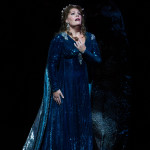 Ever since first catching her in the title role of Carlisle Floyd’s Robert Falls-directed “Susannah” way back in 2002 at the Lyric Opera of Chicago, I’ve been a fan of Ms. Radvanovsky’s. The love affair was rekindled when I saw her authoritative take as “Anna Bolena” for the Washington National Opera in 2012, a portrayal that blew Ms. Netrebko’s 2011 season opening version for the Met out of the water. With her remarkable “Norma” at the Met this season, she’s catapulted herself to true stardom. She used her powerful yet expressive voice to spellbinding effect in the famous aria “Casta Diva”, and from there, she was off. Her vocal and acting instincts as the tempestuous Druidess made her “Norma” one for the ages (despite John Conklin’s confusing and ugly production).
Ever since first catching her in the title role of Carlisle Floyd’s Robert Falls-directed “Susannah” way back in 2002 at the Lyric Opera of Chicago, I’ve been a fan of Ms. Radvanovsky’s. The love affair was rekindled when I saw her authoritative take as “Anna Bolena” for the Washington National Opera in 2012, a portrayal that blew Ms. Netrebko’s 2011 season opening version for the Met out of the water. With her remarkable “Norma” at the Met this season, she’s catapulted herself to true stardom. She used her powerful yet expressive voice to spellbinding effect in the famous aria “Casta Diva”, and from there, she was off. Her vocal and acting instincts as the tempestuous Druidess made her “Norma” one for the ages (despite John Conklin’s confusing and ugly production).
3. A supreme revival of Richard Strauss’s “Die Frau Ohne Schatten”
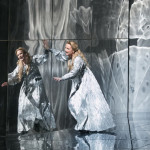 “Die Frau Ohne Schatten” is Richard Strauss’s “Die Zauberflote”. Both operas are about achieving marital bliss by means of metaphysical transformation. However, unlike the light, accessible style of Mozart’s famous opera, “Frau” needs similar musical and technical resources as ones necessary to stage a successful Ring Cycle. Luckily, the stars were aligned for this superlative revival of the Met’s production of “Frau”, which is directed and designed on a huge, expressionistic scale by Herbert Wernicke. Vladimir Jurowski mustered a heroic, cohesive account of Strauss’s miraculous score from the excellent Met Orchestra. The cast was a dream, particularly the women. Both Christine Goerke (Dyer’s Wife) and Anne Schwanewilms (the Empress) were able to produce stunning vocal beauty while easily penetrating through the thick orchestral wall of sound from the pit. The whole experience was cathartic on all counts, as Strauss and his librettist, Hugo von Hofmannsthal, intended their masterpiece to be.
“Die Frau Ohne Schatten” is Richard Strauss’s “Die Zauberflote”. Both operas are about achieving marital bliss by means of metaphysical transformation. However, unlike the light, accessible style of Mozart’s famous opera, “Frau” needs similar musical and technical resources as ones necessary to stage a successful Ring Cycle. Luckily, the stars were aligned for this superlative revival of the Met’s production of “Frau”, which is directed and designed on a huge, expressionistic scale by Herbert Wernicke. Vladimir Jurowski mustered a heroic, cohesive account of Strauss’s miraculous score from the excellent Met Orchestra. The cast was a dream, particularly the women. Both Christine Goerke (Dyer’s Wife) and Anne Schwanewilms (the Empress) were able to produce stunning vocal beauty while easily penetrating through the thick orchestral wall of sound from the pit. The whole experience was cathartic on all counts, as Strauss and his librettist, Hugo von Hofmannsthal, intended their masterpiece to be.
4. The new production of Borodin’s “Prince Igor” is a keeper
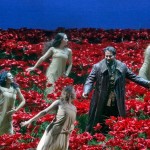 The new staging of Borodin’s “Prince Igor” is the kind of artistic success that Peter Gelb is continually on the lookout for. It is the kind of production that reclaims an opera like this one (which is not widely known outside of its native Russia) and boldly asserts the work into the repertoire. Director and designer Dmitri Tcherniakov daringly put on latex gloves and did some extensive surgery on the work’s existing material, which was left unfinished at Borodin’s death, to come up with this exhilarating fever dream of a production. In the title role, Ildar Abdrazakov gave us a moving, probing performance as the opera’s reluctant, regretful, yet ultimately hopeful hero. Gianandrea Noseda conducted a passionate performance via the always wonderful Met Orchestra.
The new staging of Borodin’s “Prince Igor” is the kind of artistic success that Peter Gelb is continually on the lookout for. It is the kind of production that reclaims an opera like this one (which is not widely known outside of its native Russia) and boldly asserts the work into the repertoire. Director and designer Dmitri Tcherniakov daringly put on latex gloves and did some extensive surgery on the work’s existing material, which was left unfinished at Borodin’s death, to come up with this exhilarating fever dream of a production. In the title role, Ildar Abdrazakov gave us a moving, probing performance as the opera’s reluctant, regretful, yet ultimately hopeful hero. Gianandrea Noseda conducted a passionate performance via the always wonderful Met Orchestra.
5. Breakout tenor Javier Camarena (almost) steals the show from “La Cenerentola”
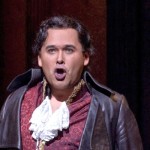 My opera season ended on a really high note with a firing-on-all-cylinders account of Rossini’s “La Cenerentola”, or Cinderella. At first, I was a bit disappointed to learn that Juan Diego Florez would not be singing as the Prince at the performance I was attending (opening night). No matter, I still had the wonderful Joyce DiDonato as Cinderella to look forward to. As expected, Ms. DiDonato was spectacular, riding the thrilling bel canto trills with command and finesse. However, it was the breathtaking Mexican tenor Javier Camarena as the Prince who attracted the most enthusiastic ovations. What a find: he has Pavarotti’s effortless vocal prowess (those thrilling high notes!) but with a pleasing roundness that makes it go down very smoothly. Despite his diminutive stature (Ms. DiDonato towered over him), he exudes a charismatic, open persona that makes him a really attractive and inviting stage presence. At a subsequent performance, he allegedly did the unprecedented – he sang an encore at the Met. Here’s to seeing Mr. Camarena repeatedly over the years to come.
My opera season ended on a really high note with a firing-on-all-cylinders account of Rossini’s “La Cenerentola”, or Cinderella. At first, I was a bit disappointed to learn that Juan Diego Florez would not be singing as the Prince at the performance I was attending (opening night). No matter, I still had the wonderful Joyce DiDonato as Cinderella to look forward to. As expected, Ms. DiDonato was spectacular, riding the thrilling bel canto trills with command and finesse. However, it was the breathtaking Mexican tenor Javier Camarena as the Prince who attracted the most enthusiastic ovations. What a find: he has Pavarotti’s effortless vocal prowess (those thrilling high notes!) but with a pleasing roundness that makes it go down very smoothly. Despite his diminutive stature (Ms. DiDonato towered over him), he exudes a charismatic, open persona that makes him a really attractive and inviting stage presence. At a subsequent performance, he allegedly did the unprecedented – he sang an encore at the Met. Here’s to seeing Mr. Camarena repeatedly over the years to come.
SEASON DISAPPOINTMENTS
1. A lackluster celebration of Britten’s Centennial
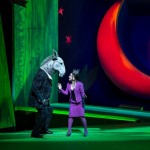 Benjamin Britten was one of the major voices in opera in the 20th century, and 2013 marked his centennial. Therefore, it was a bit disappointing that he was only represented in the Met’s season by a revival of his minor, albeit charming, adaptation of Shakespeare’s “A Midsummer Night’s Dream”. Luckily, his major operas were showcased elsewhere in the city, including breathtaking renditions of “Peter Grimes” (in concert at Carnegie Hall via the St. Louis Orchestra) and “Billy Budd” (in full production at BAM via the Glyndebourne Festival, which for me was the most exciting experience I had at an opera all season). The Met, arguable the most revered opera institution in the world, should have been at the forefront of Britten’s centennial celebration along with these other great institutions. Regrettably, it feels like they skimped on the party and gave us a twofer that also celebrated Shakespeare’s 450th birthday along with Britten’s centennial.
Benjamin Britten was one of the major voices in opera in the 20th century, and 2013 marked his centennial. Therefore, it was a bit disappointing that he was only represented in the Met’s season by a revival of his minor, albeit charming, adaptation of Shakespeare’s “A Midsummer Night’s Dream”. Luckily, his major operas were showcased elsewhere in the city, including breathtaking renditions of “Peter Grimes” (in concert at Carnegie Hall via the St. Louis Orchestra) and “Billy Budd” (in full production at BAM via the Glyndebourne Festival, which for me was the most exciting experience I had at an opera all season). The Met, arguable the most revered opera institution in the world, should have been at the forefront of Britten’s centennial celebration along with these other great institutions. Regrettably, it feels like they skimped on the party and gave us a twofer that also celebrated Shakespeare’s 450th birthday along with Britten’s centennial.
2. So long to the beloved production of Richard Strauss’s “Der Rosenkavalier”
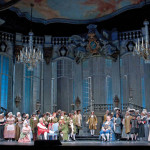 Since one of Peter Gelb’s most controversial missions is to steadily dispatch and replace creaky, old (but much loved) warhorse productions in the Met’s repertory, it was only a matter of time before he got to Nathaniel Merrill’s classic 1969 (!) staging of the Richard Strauss favorite, “Der Rosenkavalier”. Shortly after this winter’s run, which I luckily caught in a wonderful performance, Mr. Gelb announced that he was retiring the legendary production, much to the chagrin of the Met’s many rabid traditionalist fans. Although I’ll surely miss the countless loving details of Merrill’s production, I am hopeful that Gelb will replace it with a production that doesn’t severely distort the creators’ original vision (to me, the mid-18th century Viennese setting is inextricable from the opera) while injecting it with a fresh, psychologically astute perspective.
Since one of Peter Gelb’s most controversial missions is to steadily dispatch and replace creaky, old (but much loved) warhorse productions in the Met’s repertory, it was only a matter of time before he got to Nathaniel Merrill’s classic 1969 (!) staging of the Richard Strauss favorite, “Der Rosenkavalier”. Shortly after this winter’s run, which I luckily caught in a wonderful performance, Mr. Gelb announced that he was retiring the legendary production, much to the chagrin of the Met’s many rabid traditionalist fans. Although I’ll surely miss the countless loving details of Merrill’s production, I am hopeful that Gelb will replace it with a production that doesn’t severely distort the creators’ original vision (to me, the mid-18th century Viennese setting is inextricable from the opera) while injecting it with a fresh, psychologically astute perspective.
3. An underpowered Renee Fleming in Dvorak’s “Rusalka”
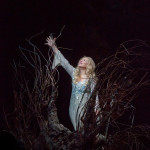 One of the big disappointments of the 2013-2014 Met season for me was Renee Fleming’s less-than-stellar return to one of her signature roles, the title character in Dvorak’s romantic opera, “Rusalka”. Although Fleming remains a lovely, even captivating, actress, her voice is no longer what it once was. I encountered Ms. Fleming in the first opera I ever saw live as the the Marschallin in Richard Strass’s “Der Rosenkavalier”, alongside Susan Graham’s radiant and robust Octavian, circa 2000 at the Royal Opera House. Suffice to say, I was hooked on opera and Ms. Fleming’s creamy, luxuriously expressive voice thereafter. Over the years, I’ve tried to catch her in live performance whenever and wherever I could. Unfortunately, in recent outings, I’ve noticed that her voice has significantly thinned and does not quite have the lyrical ease it once had. This season’s “Rusalka” confirmed these observations, which I had hoped to attribute to temporary lapses into vocal difficulty (on the contrary, one of the success stories of the Met season was Deborah Voigt’s solid comeback in Berg’s “Wozzeck” after her well-publicized vocal hardships as Brunhilde in Robert Legpage’s much-talked-about stagings of Wagner’s Ring Cycle). But, what triumphs Ms. Fleming has had over the years! Brava … Ms. Fleming will always be a diva of the first order to me.
One of the big disappointments of the 2013-2014 Met season for me was Renee Fleming’s less-than-stellar return to one of her signature roles, the title character in Dvorak’s romantic opera, “Rusalka”. Although Fleming remains a lovely, even captivating, actress, her voice is no longer what it once was. I encountered Ms. Fleming in the first opera I ever saw live as the the Marschallin in Richard Strass’s “Der Rosenkavalier”, alongside Susan Graham’s radiant and robust Octavian, circa 2000 at the Royal Opera House. Suffice to say, I was hooked on opera and Ms. Fleming’s creamy, luxuriously expressive voice thereafter. Over the years, I’ve tried to catch her in live performance whenever and wherever I could. Unfortunately, in recent outings, I’ve noticed that her voice has significantly thinned and does not quite have the lyrical ease it once had. This season’s “Rusalka” confirmed these observations, which I had hoped to attribute to temporary lapses into vocal difficulty (on the contrary, one of the success stories of the Met season was Deborah Voigt’s solid comeback in Berg’s “Wozzeck” after her well-publicized vocal hardships as Brunhilde in Robert Legpage’s much-talked-about stagings of Wagner’s Ring Cycle). But, what triumphs Ms. Fleming has had over the years! Brava … Ms. Fleming will always be a diva of the first order to me.
4. The bloated, un-funny new production of Johann Strauss II’s “Die Fledermaus”
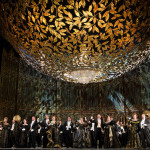 Another low point in the Met’s season was its dismal new production of Johann Strauss II’s “Die Fledermaus”, which was designed to usher in the New Year with a bang. What could have gone wrong? On paper, it had an enticing pedigree: (1) a respected director with a terrific track record in Jeremy Sams; (2) the hilarious dialogue of playwright Douglas Carter Beane; (3) Broadway veterans like of Danny Burstein in the non-singing roles; and (4) of course, Strauss’s irresistibly charming score. In actuality, however, the results were almost unbearably bad. Given the musical theater approach to the material, the production felt ludicrously overstuffed and overlong at nearly four hours of runtime. The show would have worked much better had a couple of hours been shaved off, and if the worlds of opera and musical theater were allowed to more fully mesh (for example, not once did I hear one of our talented musical theater actors sing a single note of music on their own). The only success of the evening was Richard Jones’ elegant art nouveau-inspired scenic design, which never failed to ravish throughout the evening. It’s a bad sign when the only thing you hum upon leaving the theater are the sets.
Another low point in the Met’s season was its dismal new production of Johann Strauss II’s “Die Fledermaus”, which was designed to usher in the New Year with a bang. What could have gone wrong? On paper, it had an enticing pedigree: (1) a respected director with a terrific track record in Jeremy Sams; (2) the hilarious dialogue of playwright Douglas Carter Beane; (3) Broadway veterans like of Danny Burstein in the non-singing roles; and (4) of course, Strauss’s irresistibly charming score. In actuality, however, the results were almost unbearably bad. Given the musical theater approach to the material, the production felt ludicrously overstuffed and overlong at nearly four hours of runtime. The show would have worked much better had a couple of hours been shaved off, and if the worlds of opera and musical theater were allowed to more fully mesh (for example, not once did I hear one of our talented musical theater actors sing a single note of music on their own). The only success of the evening was Richard Jones’ elegant art nouveau-inspired scenic design, which never failed to ravish throughout the evening. It’s a bad sign when the only thing you hum upon leaving the theater are the sets.
5. Who’s on tonight? … or this season’s “Wozzeck”
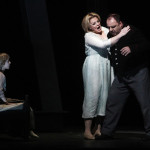 What happened here was less a disappointment and more an interesting turn of events. Thomas Hampson was supposed to have starred in the brief run of Berg’s expressionistic “Wozzeck” this season at the Met. Instead, three performers ended up sharing the title role through the run. When Mr. Hampson opted out of the first few performances due to illness, the Met tapped Matthias Goerne, who was coincidentally in town for a one-night concert rendition of “Wozzeck” with the Vienna Philharmonic and Vienna State Opera at Carnegie Hall, which Mr. Goerne played to great acclaim. Fortunately, he was also at the Met’s dress rehearsal of “Wozzeck” (what are odds?) and agreed to go on, receiving some more glowing notices for his opening night performance at the Met. Unfortunately, Mr. Goerne could only perform that one performance. As such, the Met management pulled in Daniel Sutin to play the third performance, which is the performance I attended (Mr. Sutin was perfectly fine). For the few remaining performances, Mr. Hampson was deemed healthy enough to perform. It’s fascinating how things play out in live performances, particularly opera, where singers are booked to appear in roles years in advance. Who knows how one’s health, voice, and ego are up to the challenge that far in advance? Ah, but as they say, the show must go on!
What happened here was less a disappointment and more an interesting turn of events. Thomas Hampson was supposed to have starred in the brief run of Berg’s expressionistic “Wozzeck” this season at the Met. Instead, three performers ended up sharing the title role through the run. When Mr. Hampson opted out of the first few performances due to illness, the Met tapped Matthias Goerne, who was coincidentally in town for a one-night concert rendition of “Wozzeck” with the Vienna Philharmonic and Vienna State Opera at Carnegie Hall, which Mr. Goerne played to great acclaim. Fortunately, he was also at the Met’s dress rehearsal of “Wozzeck” (what are odds?) and agreed to go on, receiving some more glowing notices for his opening night performance at the Met. Unfortunately, Mr. Goerne could only perform that one performance. As such, the Met management pulled in Daniel Sutin to play the third performance, which is the performance I attended (Mr. Sutin was perfectly fine). For the few remaining performances, Mr. Hampson was deemed healthy enough to perform. It’s fascinating how things play out in live performances, particularly opera, where singers are booked to appear in roles years in advance. Who knows how one’s health, voice, and ego are up to the challenge that far in advance? Ah, but as they say, the show must go on!
THE COMPLETE LIST
Here’s a complete list of the operas I attended at the Met during its 2013-2014 season:
1. Cosi fan tutte (9/24)
2. The Nose (9/28)
3. Norma (9/30)
4. Eugene Onegin (10/1)
5. A Midsummer Night’s Dream (10/15)
6. Tosca (10/29)
7. Two Boys (11/9)
8. Die Frau Ohne Schatten (11/20)
9. Der Rosenkavalier (11/25)
10. The Magic Flute (1/2)
11. Falstaff (1/6)
12. Die Fledermaus (1/7)
13. Madama Butterfly (1/20)
14. Rusalka (1/27)
15. La Boheme (1/30)
16. Prince Igor (2/10)
17. Werther (3/3)
18. Wozzeck (3/10)
19. The Enchanted Island (3/20)
20. La Sonnambula (3/25)
21. Andrea Chenier (3/31)
22. Arabella (4/7)
23. I Puritani (4/17)
24. La Cenerentola (4/21)

 Copyright © 2025
Copyright © 2025
Leave a Reply